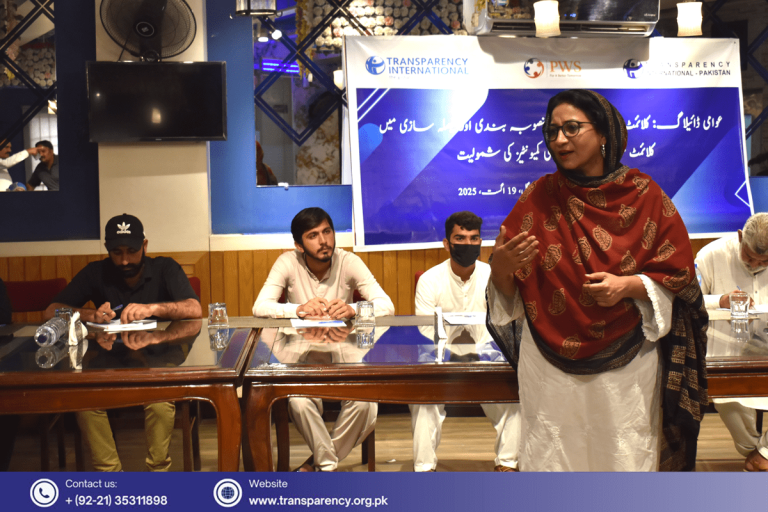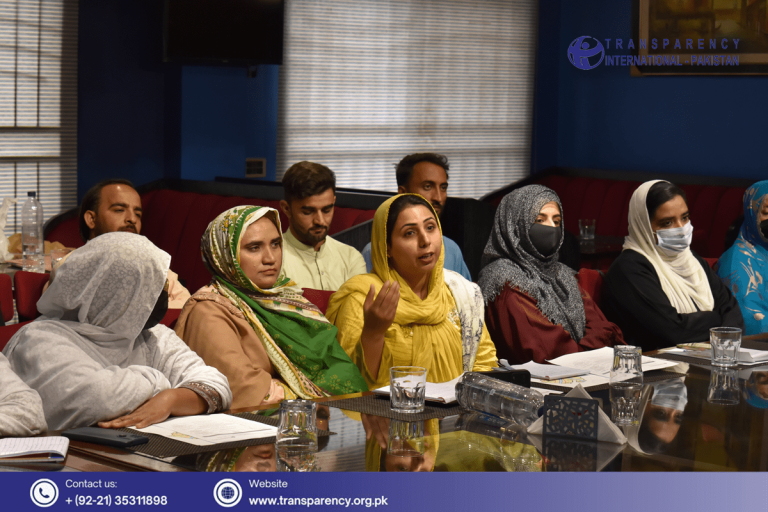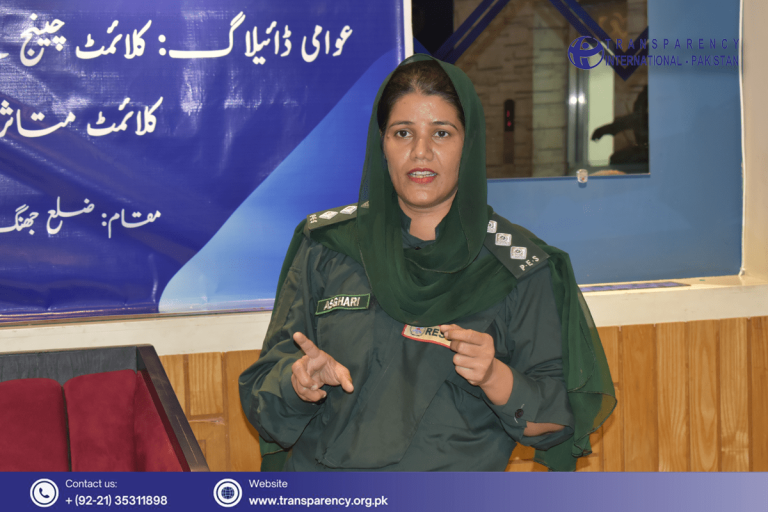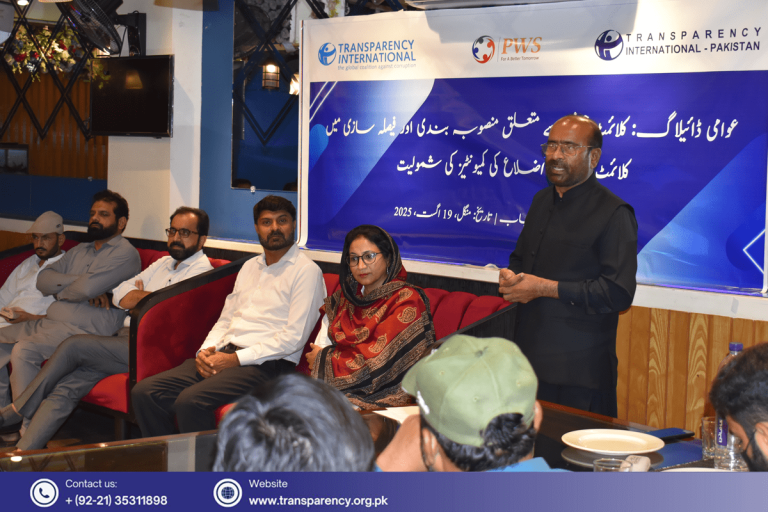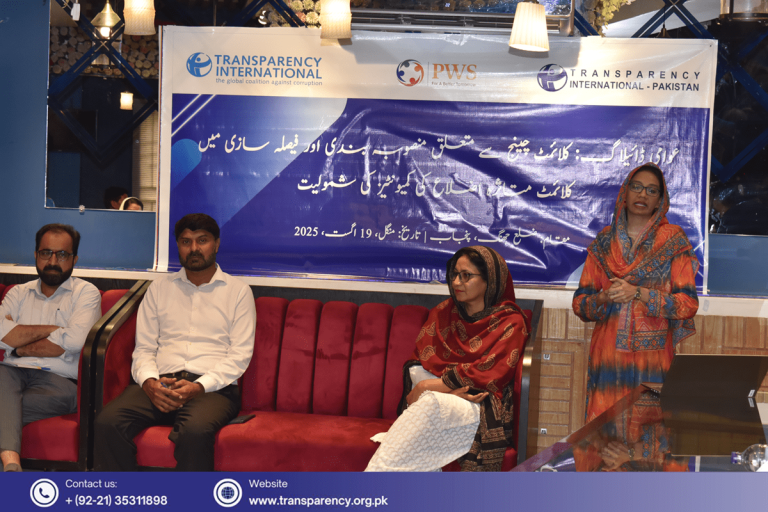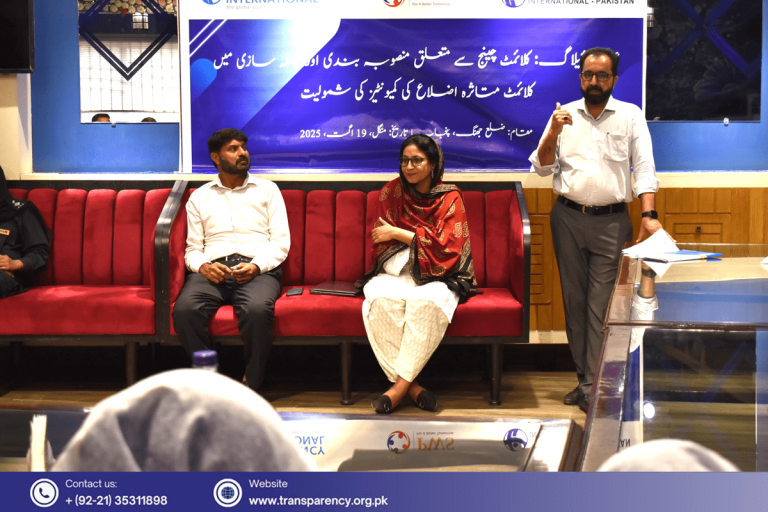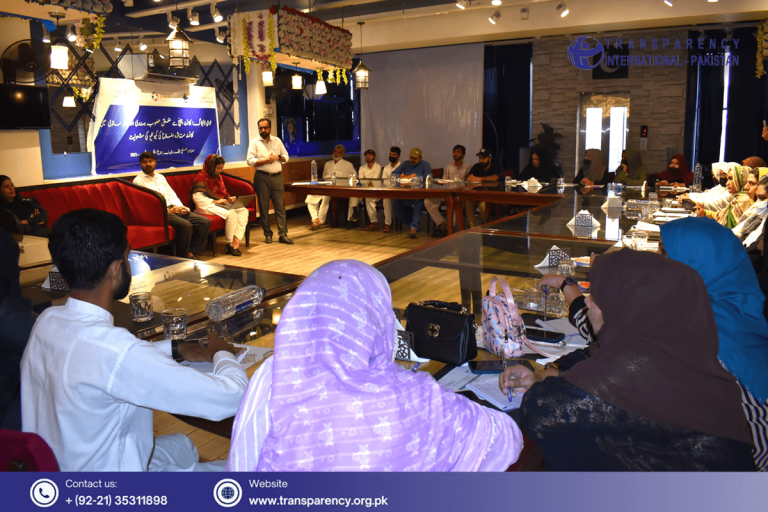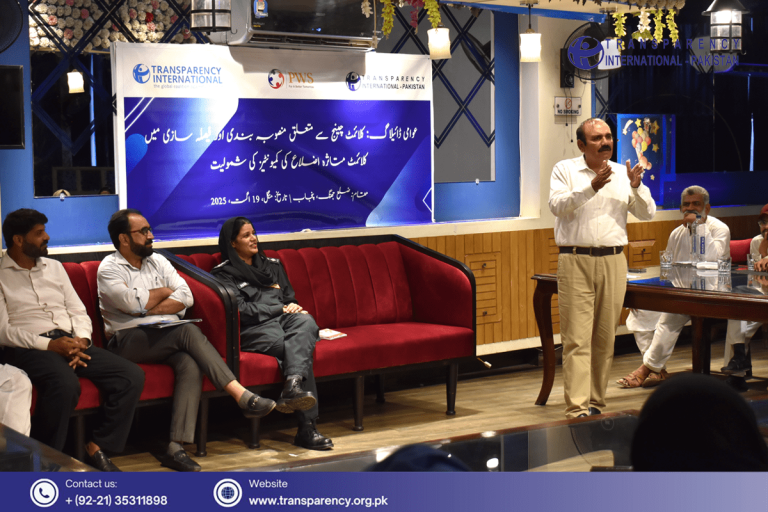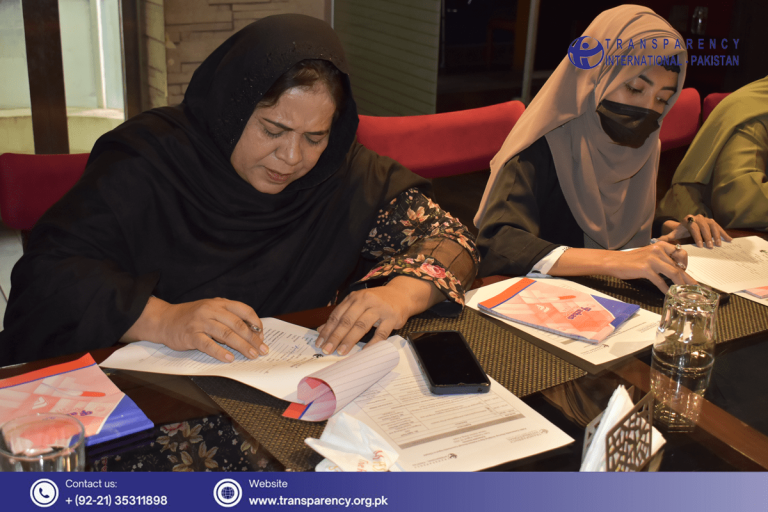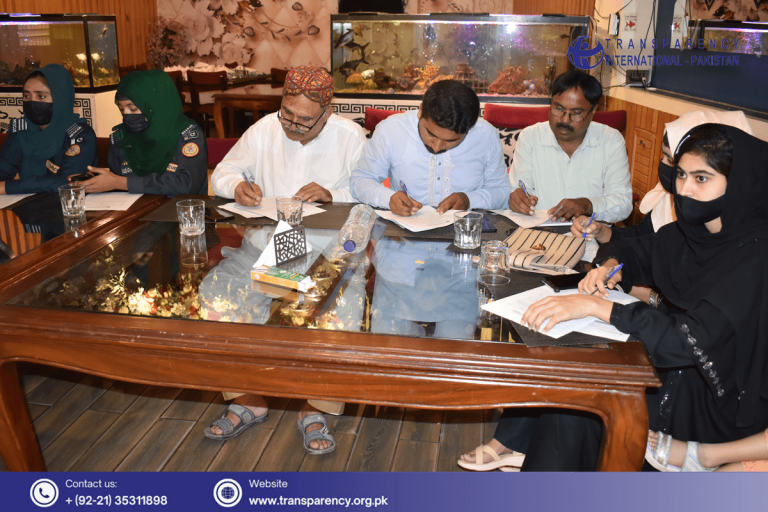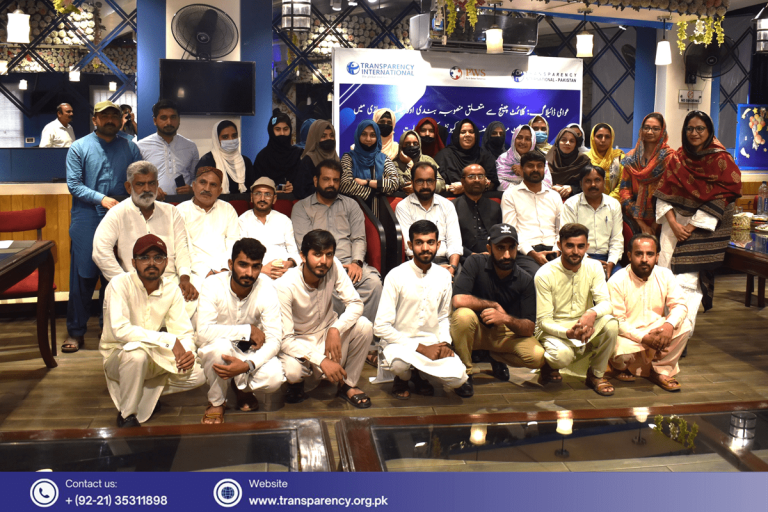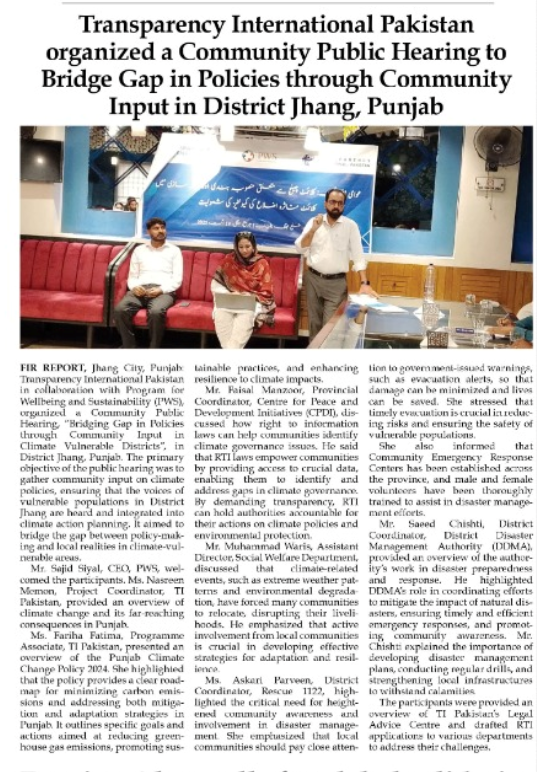Public Community Hearing on Community-Driven Climate Action
Public Community Hearing on Community-Driven Climate Action
Venue: District Jhang, Punjab
Date: Tuesday, August 19, 2025
Transparency International Pakistan (TIP), in collaboration with the Program for Wellbeing and Sustainability (PWS), organized a Public Community Hearing titled ‘Bridging the Gap in Policies through Community Input’ in District Jhang, Punjab. The primary objective was to transform climate governance from a top-down implementation model into an inclusive, community-driven decision-making process.
This social accountability forum assembled 45 community members, including 21 women from Tehsil Jhang and Tehsil Ahmad Pur Sial, alongside representatives from the District Administration and the District Disaster Management Authority (DDMA). The gathering facilitated a direct dialogue on climate vulnerabilities, emergency preparedness, and disaster risk reduction strategies.
Mr. Sajid Siyal, CEO of PWS, welcomed participants and outlined the severe climate challenges facing District Jhang. He highlighted the catastrophic 2022 floods, during which the district saw villages submerging into water, thousands of acres of farmland was devastated and many citizens were displaced. Ms. Nasreen Memon, Project Coordinator, TIP, introduced the Climate Governance Integrity Program (CGIP). She also briefed the community on TI Pakistan’s Advocacy and Legal Advice Center (ALAC), informing participants that ALAC offers free legal counsel to victims and witnesses of environmental corruption.
Ms. Fariha Fatima, Program Associate, TIP, presented the Punjab Climate Change Policy 2024 and its Action Plan, emphasizing its focus on transparency and inclusiveness in climate decision-making. The session raised community awareness about government priorities and planned actions, empowering participants to understand their role in adaptation, mitigation, and participation in climate decision-making. This engagement fostered trust, accountability, and community empowerment.
Moving on, Mr. Saeed Chishti, District Coordinator for DDMA, Government of Punjab, addressed the importance of strengthening Community-Based Disaster Risk Reduction (CBDRR). He explained that DDMA leads in preparing disaster plans, disseminating early warnings, managing evacuations, and coordinating emergency relief efforts. He informed the community about the work of DDMA, sharing that it collaborates closely with government departments, local officials, and communities to identify high-risk areas, assess vulnerabilities, and develop safety plans. The authority also builds local capacity by training volunteers in flood preparedness to enhance disaster response.
Furthermore, he encouraged communities to contact DDMA to report hazards, seek guidance on safe construction, and establish local disaster management committees. He also emphasized the necessity of reinforcing river embankments, ensuring access to safe drinking water, and improving shelter and health services. Robust communication with DDMA, he noted, is essential for building resilience.
In the subsequent session, Mr. Faisal Manzoor, Provincial Coordinator at the Centre for Peace and Development Initiatives (CPDI), highlighted how Right to Information (RTI) laws empower citizens to obtain details on climate policies, identify gaps, and ensure accountability. He stressed that utilizing RTI promotes transparency, strengthens monitoring, and boosts community participation in climate action. Participants received hands-on training in submitting RTI applications under the Punjab Transparency and Right to Information Act 2013. They learned the correct application format, submission channels, and the categories of information they can request. Trainers provided step-by-step instructions on addressing applications to the designated Public Information Officer (PIO), drafting clear subject lines, and framing questions precisely. Guidance also included citing relevant sections of the Act and providing necessary contact details as legally required.
Next, Mr. Muhammad Waris, Assistant Director at the Social Welfare Department, explained that floods frequently force families from their homes, severely disrupting lives. He shared that during the 2022 floods, the department established relief camps offering food, shelter, and safe spaces for displaced individuals, with special attention to women, children, the elderly, and persons with disabilities. The department also provided counseling, vocational training, and rehabilitation support to aid recovery.
Ms. Asghari Parveen, District Coordinator at Rescue 1122, underscored the vital importance of community awareness in disaster management. She urged residents to heed official warnings and evacuation orders to minimize damage and save lives. She explained that Community Emergency Response Centers are now operational across Punjab, staffed with trained male and female volunteers who support preparedness and response initiatives.
She added that Rescue 1122 plays a critical role during floods by executing evacuations, performing water rescues using boats and specialized equipment, administering first aid, and transporting individuals safely to relief camps. The service maintains a 24/7 operational helpline and coordinates its efforts with DDMA.
Following the presentations, community members directly engaged with authorities, contributing their experiences to inform policy solutions. This public hearing established critical accountability relationships, ensuring climate governance addresses actual community needs and involves citizens in decision-making. This approach transforms affected populations from passive beneficiaries into active stakeholders, rendering climate decision-making more transparent, responsive, and effective at the local level.
Communities urged policymakers to demand farmer subsidies, promote climate-resilient agriculture, improve irrigation systems, address encroachments and enhance health protections during heatwaves and floods. They also stressed safeguarding education from climate disruptions. The community called on non-governmental organizations and community-based organizations to amplify local voices, involve citizens in decision-making, and design inclusive, people-centered policies. Immediate support is essential to protect the livelihoods, health, and future of vulnerable families in Jhang District.
Ms. Nasreen Memon provided a comprehensive overview of TI Pakistan’s Advocacy and Legal Advice Centre (ALAC). She explained its role in tackling environmental issues. ALAC provides free legal advice to help communities seek redress for their problems and engages government agencies to improve climate governance. She also introduced the ALAC complaint form, which participants completed with their specific issues. These submissions will be assessed, and ALAC will provide advice on relevant cases.
During the hearing, participants highlighted urgent climate, such as irregular rainfall, repeated floods, and intensifying heatwaves that severely impact livelihoods. Farmers described how continual crop losses drive them into debt, while women emphasized the effects on food security, health, and family dignity. They noted that children are particularly susceptible to malnutrition and associated health problems.
Ms. Nasreen Memon and district officials demonstrated how the Punjab Transparency and Right to Information Act empowers citizens to access information on budget allocations, disaster preparedness plans, and climate adaptation initiatives. They emphasized that filing RTI applications serves as a practical mechanism to promote governmental transparency and guarantee fair resource distribution.
The public hearing offered a vital platform for participants to amplify perspectives that are too often marginalized. They expressed a powerful sense of inclusion and a strong desire for these dialogues to become a sustained channel to policymakers. The session left them with renewed hope, a sense of dignity, and the concrete assurance that their concerns would be officially represented.

